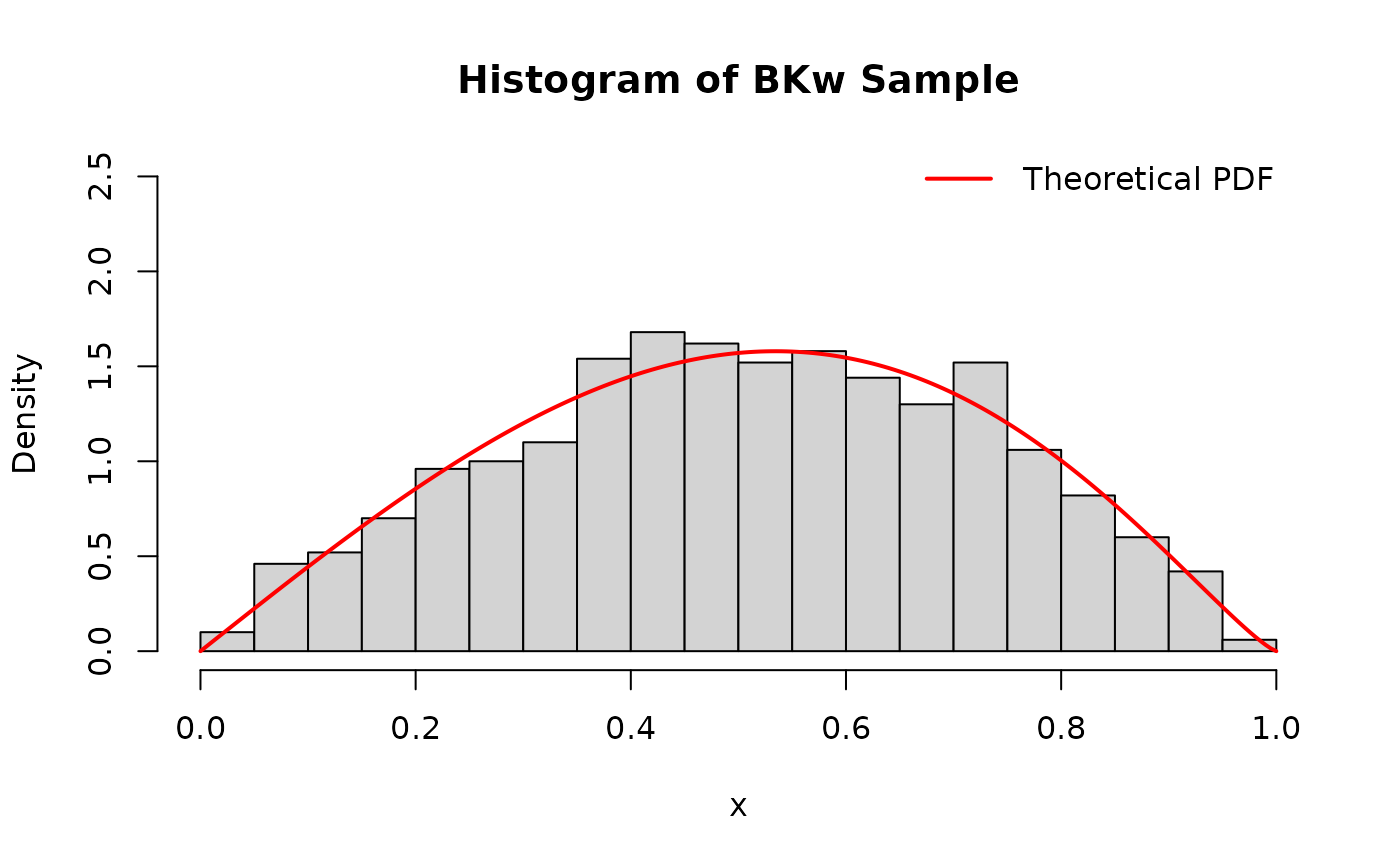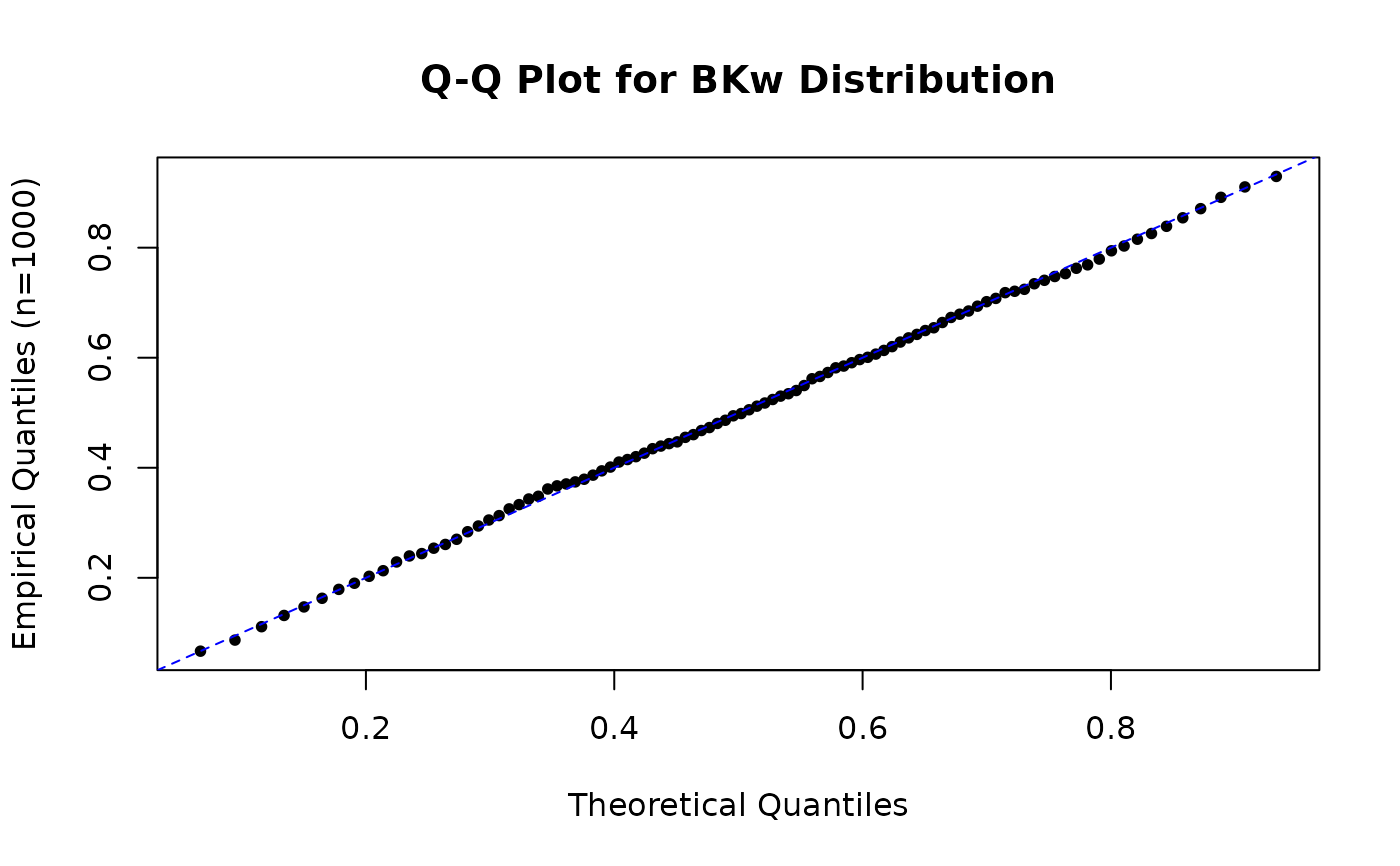Generates random deviates from the Beta-Kumaraswamy (BKw) distribution
with parameters alpha (\(\alpha\)), beta (\(\beta\)),
gamma (\(\gamma\)), and delta (\(\delta\)). This distribution
is a special case of the Generalized Kumaraswamy (GKw) distribution where
the parameter \(\lambda = 1\).
Arguments
- n
Number of observations. If
length(n) > 1, the length is taken to be the number required. Must be a non-negative integer.- alpha
Shape parameter
alpha> 0. Can be a scalar or a vector. Default: 1.0.- beta
Shape parameter
beta> 0. Can be a scalar or a vector. Default: 1.0.- gamma
Shape parameter
gamma> 0. Can be a scalar or a vector. Default: 1.0.- delta
Shape parameter
delta>= 0. Can be a scalar or a vector. Default: 0.0.
Value
A vector of length n containing random deviates from the BKw
distribution. The length of the result is determined by n and the
recycling rule applied to the parameters (alpha, beta,
gamma, delta). Returns NaN if parameters
are invalid (e.g., alpha <= 0, beta <= 0, gamma <= 0,
delta < 0).
Details
The generation method uses the relationship between the GKw distribution and the
Beta distribution. The general procedure for GKw (rgkw) is:
If \(W \sim \mathrm{Beta}(\gamma, \delta+1)\), then
\(X = \{1 - [1 - W^{1/\lambda}]^{1/\beta}\}^{1/\alpha}\) follows the
GKw(\(\alpha, \beta, \gamma, \delta, \lambda\)) distribution.
For the BKw distribution, \(\lambda=1\). Therefore, the algorithm simplifies to:
Generate \(V \sim \mathrm{Beta}(\gamma, \delta+1)\) using
rbeta.Compute the BKw variate \(X = \{1 - (1 - V)^{1/\beta}\}^{1/\alpha}\).
This procedure is implemented efficiently, handling parameter recycling as needed.
References
Cordeiro, G. M., & de Castro, M. (2011). A new family of generalized distributions. Journal of Statistical Computation and Simulation,
Kumaraswamy, P. (1980). A generalized probability density function for double-bounded random processes. Journal of Hydrology, 46(1-2), 79-88.
Devroye, L. (1986). Non-Uniform Random Variate Generation. Springer-Verlag. (General methods for random variate generation).
Examples
# \donttest{
set.seed(2026) # for reproducibility
# Generate 1000 random values from a specific BKw distribution
alpha_par <- 2.0
beta_par <- 1.5
gamma_par <- 1.0
delta_par <- 0.5
x_sample_bkw <- rbkw(1000,
alpha = alpha_par, beta = beta_par,
gamma = gamma_par, delta = delta_par
)
summary(x_sample_bkw)
#> Min. 1st Qu. Median Mean 3rd Qu. Max.
#> 0.01187 0.36143 0.51194 0.51019 0.67906 0.99278
# Histogram of generated values compared to theoretical density
hist(x_sample_bkw,
breaks = 30, freq = FALSE, # freq=FALSE for density
main = "Histogram of BKw Sample", xlab = "x", ylim = c(0, 2.5)
)
curve(
dbkw(x,
alpha = alpha_par, beta = beta_par, gamma = gamma_par,
delta = delta_par
),
add = TRUE, col = "red", lwd = 2, n = 201
)
legend("topright", legend = "Theoretical PDF", col = "red", lwd = 2, bty = "n")
 # Comparing empirical and theoretical quantiles (Q-Q plot)
prob_points <- seq(0.01, 0.99, by = 0.01)
theo_quantiles <- qbkw(prob_points,
alpha = alpha_par, beta = beta_par,
gamma = gamma_par, delta = delta_par
)
emp_quantiles <- quantile(x_sample_bkw, prob_points, type = 7)
plot(theo_quantiles, emp_quantiles,
pch = 16, cex = 0.8,
main = "Q-Q Plot for BKw Distribution",
xlab = "Theoretical Quantiles", ylab = "Empirical Quantiles (n=1000)"
)
abline(a = 0, b = 1, col = "blue", lty = 2)
# Comparing empirical and theoretical quantiles (Q-Q plot)
prob_points <- seq(0.01, 0.99, by = 0.01)
theo_quantiles <- qbkw(prob_points,
alpha = alpha_par, beta = beta_par,
gamma = gamma_par, delta = delta_par
)
emp_quantiles <- quantile(x_sample_bkw, prob_points, type = 7)
plot(theo_quantiles, emp_quantiles,
pch = 16, cex = 0.8,
main = "Q-Q Plot for BKw Distribution",
xlab = "Theoretical Quantiles", ylab = "Empirical Quantiles (n=1000)"
)
abline(a = 0, b = 1, col = "blue", lty = 2)
 # Compare summary stats with rgkw(..., lambda=1, ...)
# Note: individual values will differ due to randomness
x_sample_gkw <- rgkw(1000,
alpha = alpha_par, beta = beta_par, gamma = gamma_par,
delta = delta_par, lambda = 1.0
)
print("Summary stats for rbkw sample:")
#> [1] "Summary stats for rbkw sample:"
print(summary(x_sample_bkw))
#> Min. 1st Qu. Median Mean 3rd Qu. Max.
#> 0.01187 0.36143 0.51194 0.51019 0.67906 0.99278
print("Summary stats for rgkw(lambda=1) sample:")
#> [1] "Summary stats for rgkw(lambda=1) sample:"
print(summary(x_sample_gkw)) # Should be similar
#> Min. 1st Qu. Median Mean 3rd Qu. Max.
#> 0.04279 0.36298 0.52400 0.51632 0.67744 0.98445
# }
# Compare summary stats with rgkw(..., lambda=1, ...)
# Note: individual values will differ due to randomness
x_sample_gkw <- rgkw(1000,
alpha = alpha_par, beta = beta_par, gamma = gamma_par,
delta = delta_par, lambda = 1.0
)
print("Summary stats for rbkw sample:")
#> [1] "Summary stats for rbkw sample:"
print(summary(x_sample_bkw))
#> Min. 1st Qu. Median Mean 3rd Qu. Max.
#> 0.01187 0.36143 0.51194 0.51019 0.67906 0.99278
print("Summary stats for rgkw(lambda=1) sample:")
#> [1] "Summary stats for rgkw(lambda=1) sample:"
print(summary(x_sample_gkw)) # Should be similar
#> Min. 1st Qu. Median Mean 3rd Qu. Max.
#> 0.04279 0.36298 0.52400 0.51632 0.67744 0.98445
# }